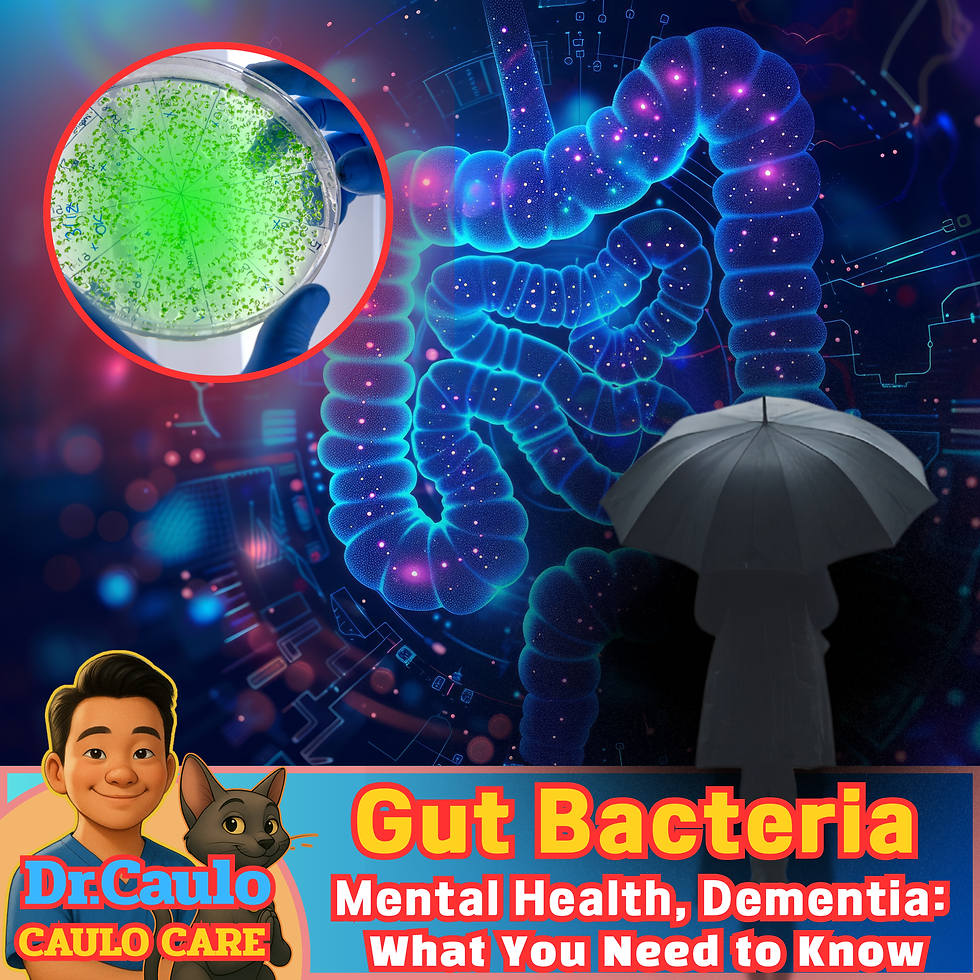Uncovering the Hidden Risks of Ignoring IBS and How TCM Can Help
- caulocare
- Apr 21, 2025
- 7 min read

Irritable Bowel Syndrome (IBS) is often dismissed as “just a stomach issue,” but it’s time to take this condition seriously. IBS can deeply impact daily life, emotional health, and overall well-being. Understanding the hidden dangers of ignoring IBS and considering effective therapies like Traditional Chinese Medicine (TCM) is crucial for anyone affected by this condition.
Understanding IBS: More Than Just Gut Trouble
IBS is a chronic gastrointestinal disorder with symptoms that include abdominal pain, bloating, gas, and shifts in bowel habits. According to the International Foundation for Gastrointestinal Disorders, as many as 10 to 15 percent of adults in the United States suffer from IBS. Notably, symptoms can greatly vary between individuals, adding to the frustration.
Ignoring these symptoms can have serious consequences. For instance, chronic inflammation in the gut can lead to malabsorption of vital nutrients. This can cause deficiencies in essential vitamins and minerals, negatively affecting your overall health. For example, a lack of vitamin D can contribute to weakened bones and a compromised immune system.
✅ Definition (Simple English):
IBS is a condition where your gut (especially your large intestine) becomes extra sensitive. It can cause cramps, bloating, gas, diarrhea, and constipation, often coming and going.
🔍 Main Symptoms of IBS:
Abdominal pain or cramping
Bloating and gas
Diarrhea, constipation, or both
Mucus in the stool
A feeling of incomplete bowel movements
🧠🌿 Causes & Triggers:
Brain-gut connection issues (the nerves in your intestines may be overly reactive to signals from the brain)
Stress and anxiety
Certain foods (like spicy food, caffeine, dairy, or high-FODMAP foods)
Changes in gut bacteria (dysbiosis)
Infections (like gastroenteritis)
📋 Diagnosis:
There’s no specific test for IBS. Doctors usually diagnose it by:
Checking symptoms (Rome IV criteria)
Ruling out other diseases (like IBD, celiac, or infections)
💡 Treatment & Management:
Diet changes (e.g., low FODMAP diet)
Probiotics
Stress management (yoga, mindfulness)
Medications (antispasmodics, laxatives, or anti-diarrheal drugs depending on symptoms)
Regular exercise and sleep
The Emotional Toll of IBS
Living with IBS can create significant emotional challenges. The anxiety of not knowing when symptoms will appear may lead to social withdrawal, fueling feelings of isolation. Research indicates that around 50% of people with IBS experience anxiety or depression, leading to a cycle of persistent discomfort and emotional distress.
Stigmas surrounding digestive issues can add to feelings of embarrassment and shame. It's essential to not only address the physical symptoms of IBS but also to focus on the emotional hurdles. Support groups or therapy can play a vital role in helping individuals cope more effectively with the mental strain of the condition.
Nutritional Considerations for IBS Sufferers
Diet is a critical factor in managing IBS symptoms. Many individuals find that a low-FODMAP diet helps reduce discomfort by cutting down on certain carbohydrates that can trigger symptoms. Studies suggest that up to 76% of patients with IBS experience symptom relief from following this diet.
However, it’s vital to consult a nutrition expert who specializes in IBS. They can tailor a diet plan that meets your nutritional needs while alleviating symptoms. This personalized guidance can help prevent nutrient deficiencies, ensuring you enjoy a balanced diet while managing IBS effectively.
🍽️ Western Nutrition Recommendations
✅ Foods to Eat:
🥣 Oats, brown rice – high in soluble fiber
🥦 Cooked veggies – like carrots, pumpkin, zucchini (easy to digest)
🍗 Lean proteins – chicken, fish, eggs
🥑 Healthy fats – olive oil, avocado (anti-inflammatory)
🍌 Low-FODMAP fruits – banana, blueberries, papaya
🍠 Sweet potato – gentle on the gut, nourishes the intestines
❌ Foods to Avoid:
Dairy (can trigger bloating)
Beans, lentils (ferment easily)
Raw vegetables (hard to digest for some)
Spicy & greasy foods
High-FODMAP foods (garlic, onion, apples, wheat)
🍚 Eastern (TCM) Nutrition Recommendations
In TCM, diet should strengthen the Spleen and Stomach, reduce dampness, and soothe Liver Qi (if stress-related).
✅ Recommended Foods:
🍚 Congee (rice porridge) with ginger – supports Spleen Qi
🥬 Cooked leafy greens (bok choy, spinach)
🍗 Steamed chicken or white fish
🍠 Pumpkin, yam, taro – warms and nourishes
🍵 Mung beans – cools heat if IBS is damp-heat type
🍐 Asian pear – moistens and gently detoxes
❌ Foods to Avoid:
Cold/raw foods (salads, ice drinks)
Fried or oily foods (create dampness)
Sugar, alcohol, caffeine
Too much fruit or fruit juice
🍵 Herbal Teas (Gentle and Effective)
🌿 Western Teas:
Peppermint Tea: Relieves cramping, bloating (especially for IBS-D)
Chamomile Tea: Calms the gut and reduces anxiety
Ginger Tea: Improves digestion, reduces gas and nausea
🍃 Chinese Herbal Teas (TCM-style):
Chen Pi (Dried Tangerine Peel) Tea: Moves Qi, reduces bloating and indigestion
Bai Zhu + Fu Ling Tea: Strengthens Spleen, dries damp, supports bowel balance
Shen Qu Tea: Helps digest food and regulate gut flora
Tip: Steep for at least 10 minutes. Sip warm. Avoid during acute diarrhea.
💊 Vitamins & Supplements
Western Supplements:
Probiotics (esp. Lactobacillus or Bifidobacterium strains)
Magnesium citrate (for constipation)
Vitamin D3 (gut-brain-immune support)
L-Glutamine (repairs gut lining)
Digestive enzymes (if meals cause bloating)
Eastern/Herbal Supplements (TCM):
Xiao Yao San (逍遥散): Balances Liver Qi, good for stress-IBS
Shen Ling Bai Zhu San (参苓白术散): Tonifies Spleen Qi, relieves diarrhea
Tong Xie Yao Fang (痛泻要方): Treats painful diarrhea from Liver-Spleen disharmony
🎯 BONUS TIPS:
Eat at regular times, chew slowly
Sit in a calm environment during meals
Combine acupuncture + dietary therapy for long-term balance
Warm foods are generally easier on the gut
TCM: An Ancient Approach to Digestive Health
Traditional Chinese Medicine (TCM) offers valuable insights into treating IBS. TCM views the body as an integrated whole and focuses on maintaining balance.
One of its primary methods, acupuncture, can significantly help reduce IBS symptoms. Research has shown that acupuncture can decrease abdominal pain and improve bowel regularity in many patients, with studies indicating positive results in 60 to 80% of participants.
TCM also incorporates herbal medicine, crafting personalized formulas from herbs such as ginger and licorice. A qualified TCM practitioner can provide a tailored herbal regimen aimed at addressing specific IBS symptoms, potentially leading to significant relief.
🌿 IBS in Traditional Chinese Medicine (TCM)
In TCM, IBS is not seen as a single disease but rather as a pattern of disharmony in the organs — especially involving the Spleen, Liver, and Large Intestine. The symptoms reflect imbalances of Qi (vital energy), Blood, and fluids, as well as emotions.
🔍 Common TCM Patterns of IBS:
Liver Qi Stagnation overacting on Spleen
Main symptoms: Abdominal bloating, gas, alternating constipation & diarrhea, worse with stress, emotional mood swings.
Key signs: Irritability, sighing, PMS in women.
🪷 This is one of the most common patterns for stress-related IBS.
Spleen Qi Deficiency
Main symptoms: Loose stools, fatigue, poor appetite, bloating after meals.
Key signs: Pale tongue, weak pulse.
🪷 Often seen in people with poor diet, overthinking, or after illness.
Cold in the Intestines
Main symptoms: Diarrhea with pain relieved by warmth, cold limbs, aversion to cold food/drinks.
Key signs: Watery stools, preference for warm foods.
🪷 Frequently related to eating cold/raw foods.
Damp-Heat in the Intestines
Main symptoms: Urgent diarrhea with foul odor, mucus in stool, abdominal pain, burning anus.
Key signs: Greasy yellow tongue coating, rapid pulse.
🪷 Often caused by greasy/spicy foods or external pathogens.
🧘♀️ TCM Treatment Approaches:
✅ Acupuncture:
Balances Liver-Spleen disharmony
Regulates Qi flow and calms the mind
Strengthens digestive organs
✅ Chinese Herbal Medicine (example formulas):
Xiao Yao San (逍遥散): For Liver Qi stagnation
Shen Ling Bai Zhu San (参苓白术散): For Spleen Qi deficiency and loose stools
Tong Xie Yao Fang (痛泻要方): For pain + diarrhea from Liver overacting on Spleen
✅ Dietary Therapy:
Eat warm, cooked foods
Avoid raw, cold, greasy, or spicy items
Eat mindfully, reduce stress during meals
✅ Lifestyle Advice:
Reduce stress and emotional tension
Gentle movement (Tai Chi, Qi Gong, walking)
• • Regular sleep and routine meals
The Role of Massage in IBS Management
Another effective strategy for managing IBS is massage therapy. Specifically, gastrointestinal massage can enhance digestion and relieve bloating and discomfort. By activating the vagus nerve, which regulates gut function, massage can promote relaxation and alleviate stress—a critical factor for many IBS sufferers.
Including regular massage sessions can serve as a restorative practice. This can enhance both the physical and emotional aspects of IBS, promoting a stronger connection to one's body and increasing feelings of control over symptoms.
Importance of a Holistic Treatment Plan
Given the complexities of IBS, adopting a comprehensive treatment plan is vital. Relying solely on medications can result in undesirable side effects and dependency. A holistic approach offers multiple avenues for symptom management, incorporating lifestyle, dietary changes, and alternative therapies.
Working with integrative medicine specialists can help develop a customized plan. This may involve nutritional counseling, TCM therapies, and mental health support, enabling individuals to tackle IBS from different angles effectively.
Listening to Your Body: The Key to Relief
Listening to your body is crucial when managing IBS. Overlooking symptoms can lead to worsening conditions and a lower quality of life.
Being proactive in seeking treatment and exploring options like TCM, personalized nutrition, and massage enables individuals to take charge of their health. Gaining knowledge about IBS can empower you to make meaningful changes that improve your life.
Taking Control of Your Health Journey
Irritable Bowel Syndrome may seems minor, but its impact can touch almost every aspect of life. The risks of ignoring IBS are significant and can lead to more severe complications over time. By embracing a holistic approach that includes TCM, nutrition, and emotional support, individuals can enhance their quality of life and regain control over their health. Don't overlook the signs; it’s time to take proactive steps and seek help to effectively manage IBS. Your health matters.
The path to understanding and managing IBS might be challenging, but with the right support and treatment plan, it can become much more manageable. Remember, reaching out for help is an essential step—your health is worth every effort.
This information is only educational and should not be construed as medical advice.
Everything must be balanced, and the suggestions may not apply to you.
A specialist doctor should be consulted for any medical advice or diagnosis.
BOOK AN APPOINTMENT NOW!
Acupuncture near me at Forest Hill, NY
🔶🔷🔶🔷🔶🔷🔶🔷🔶🔷🔶🔷
Dr. Phumlarp Caulo LA,c, MAc. OM, DAHM
Doctor of Acupuncture/Chinese Medicine
Caulo Care Acupuncture
🔖 By appointment only
☎️+1 (929) 269-4549




Comments